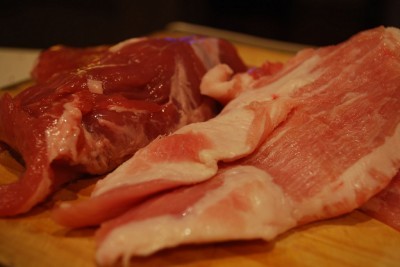






We all know that composting is not only a valuable eco-friendly tool, with the end result being a nutrient-rich soil additive for the home gardener, but it also reduces the monthly household garbage bill significantly. What many may not know, however, is what part of that garbage should or should not be added to the compost heap—namely using meat in compost. So keep reading the following meat composting info to find out more about this.
A win/win scenario for a small amount of effort, composting is the natural decay of organic refuse within controlled conditions that enable tiny organisms (bacteria, fungi and protozoa) to convert the refuse into rich, gorgeous soil.
The question is what qualifies as organic matter suitable for the compost pile. Generally, folks think about grass clippings and fruit and vegetable trimmings, but how about meat? Meat is organic material, right? So then, one might ask, “Can you compost meat scraps?”
If we consider that meat in compost is an organic material, then the easy answer is, “yes, you can compost meat scraps.” However, the question is a bit more complicated than that.
Some areas, for good reason, prohibit composting meat because of the very real possibility of pests, such as rats, raccoons and the neighbor’s dog, infiltrating the compost pile and not only creating a mess, but possibly spreading disease.
Not only can composting meat encourage pests, but it can also harbor pathogens, especially if your compost pile is not hot enough to kill them off. E coli bacteria, for example, can live for two years. Hopefully, however, there is no sign of this bacterium in the meat scraps you are trying to compost! Nonetheless, there is potential there for serious illness, or worse, if the resulting compost contaminates the table food one is growing.
Notwithstanding the potential for vermin, meat in compost piles also tends to smell a bit rank, especially if it is not mixed in and the pile is not “cooking” at a high enough temperature, although cooked meat will break down faster than raw and so tends to be a bit less offensive. This said, meat in compost is high in nitrogen and, as such, tends to facilitate the breaking down of the pile.
So, if you decide to compost meat scraps, make sure the compost is turned frequently and keep composting meat within the interior of the pile. Also, the amount of composting meat should only be a very small percentage of the entire make-up of the compost.
So far everything discussed has been in relation to the home gardener’s compost pile and whether to compost meat scraps. There are compost facilities whose job it is to dispose of animal carcasses and blood. These facilities are specifically engineered for the task and the resulting organic material is safe to use on commercial crops such as hay, corn, winter wheat, tree farms, and forests—but is not available to the home gardener.
In summary, the use of meat in composting is really up to you with regards to the information above. If you decide to compost meat scraps, remember, not too much and make sure it is a very hot, continually monitored and turned compost pile.
Can You Compost Sweetgum Balls: Learn About Sweetgum Balls In Compost
Can You Compost Onions: How To Compost Onion Peelings
Composting Fish Waste: Tips On How To Compost Fish Scraps
Can You Compost Bird Feathers: How To Compost Feathers Safely
Can You Compost Sweetgum Balls: Learn About Sweetgum Balls In Compost
Kitchen Composting: How To Compost Food Scraps From The Kitchen
Can You Compost Nuts: Information About Nut Shells In Compost
Can You Put Dryer Lint In Compost Piles: Learn About Composting Lint From Dryers
Kitchen Composting: How To Compost Food Scraps From The Kitchen
Can You Compost Nuts: Information About Nut Shells In Compost
Can You Put Dryer Lint In Compost Piles: Learn About Composting Lint From Dryers
Copyright © www.100flowers.win Botanic Garden All Rights Reserved